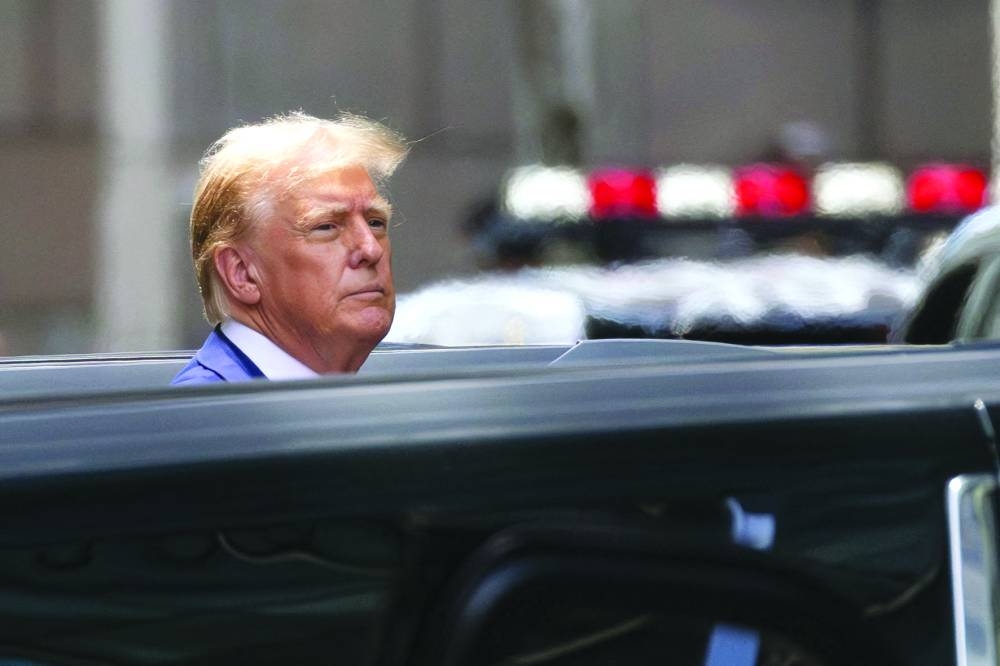A New York jury has convicted Donald Trump on all charges in his hush money case in a seismic development barely five months ahead of the election where he seeks to recapture the White House.
The historic first criminal trial of a former US president ended with the 77-year-old Trump found guilty on each of the 34 charges of falsifying business records to hide a payment meant to silence an adult entertainment actress.
Trump did not immediately react when the verdict was read, but sat still, his shoulders dipping.
The former president later declared that he would appeal the guilty verdict that made him the first US president convicted of a crime, though he will have to wait until after his sentencing on July 11 before taking that step.
In remarks yesterday at the Trump Tower lobby in Manhattan where he announced his first presidential run in 2015, Trump repeated his complaints that the trial was a “rigged” attempt to hobble his comeback White House bid and warned that it showed no American was safe from politically motivated prosecution.
“If they can do this to me, they can do this to anyone,” Trump, 77, said in an unscripted 33-minute speech.
Applauded by supporters, Trump, the Republican candidate in the 2024 election took no questions from reporters.
“We’re going to be appealing this scam,” he said.
Trump will have 30 days from the date of his July 11 sentencing to file a notice of appeal.
Democratic President Joe Biden, who will face Trump in the November 5 election, said Trump had been given an opportunity to defend himself in the same justice system that applies to all Americans.
“It’s reckless, it’s dangerous, it’s irresponsible for anyone to say this was rigged just because they don’t like the verdict,” Biden, 81, said at the White House.
The conviction thrusts the United States into uncharted political territory but does not bar Trump from a White House run, even in the unlikely event that Judge Juan Merchan sentences him to prison time.
The verdict comes just weeks before the Republican National Convention in Milwaukee, where Trump is due to receive the party’s formal nomination to face Democratic President Joe Biden on November 5.
The 12-member jury deliberated for more than 11 hours over two days at the end of the extraordinary five-week trial held in a drab Manhattan courtroom.
Trump was convicted of falsifying business records to reimburse his lawyer, Michael Cohen, for a $130,000 payment to the actress on the eve of the 2016 election, when her claim to have had a liaison with him could have proved politically fatal.
The trial featured lengthy testimony from the adult performer, who described to the court in graphic detail what she says was a 2006 encounter with the married Trump.
Prosecutors successfully laid out a case alleging that the hush money and the illegal covering up of the payment was part of a broader crime to prevent voters from knowing about Trump’s behaviour.
Trump’s defence attorneys had countered that “trying to influence an election” was simply “democracy” and that the former president did nothing wrong.
The trial has distracted Trump from his campaign to unseat Biden.
However, he milked the media attention throughout, with daily speeches in front of the cameras outside the courtroom in which he complained about being a political victim.
Identities of the 12 jurors deciding the case were kept secret, a rare practice more often see in cases involving mafia or other violent defendants.
After teasing the prospect for weeks, Trump – who denied ever having the liaison with the actress at a 2006 celebrity golf tournament – opted not to testify.
The Republican, who made his name as a brash real estate mogul before a stunning ascent to the nation’s highest office in the 2016 election, now faces prison or, more likely, probation.
In theory, he could face up to four years in jail for each count of falsifying business records but legal experts said as a first-time offender he is unlikely to go behind bars.
An appeal could take months to complete.
Any sentence on Trump would likely be suspended until the appeals process plays out.
A close ally, House of Representatives Speaker Mike Johnson, predicted the US Supreme Court would eventually overturn the verdict.
Should Trump win the presidency he will not be able to pardon himself, given that the case was not brought by the federal government but by the state of New York, where only the governor could clear his name.
Trump also faces federal and state charges of conspiring to overturn the results of the 2020 election won by Biden, and for hoarding secret documents after leaving the White House.
National opinion polls show Trump locked in a tight race with Biden, and one in four Republican respondents in an April Reuters/Ipsos poll said they would not vote for him if he were convicted of a felony by a jury.
Strategists from both parties questioned whether the verdict would have a significant impact on the race.
On pro-Trump corners of the Internet, some supporters called for riots, revolution and violent retribution.
In the battleground state of Georgia, retiree Wendell Hill, 65, said the verdict would not cause him to abandon Trump.
“It is all politicised. I still don’t understand what crime he’s supposed to have committed,” he said as he set up chairs for a concert in downtown Marietta.
Carol Cuba, 77, a longtime Republican voter, said she was disgusted with Trump.
“For the first time in my life I’m thinking about voting on the dark side,” she said referring to the Democrats.

Trump leaving Trump Tower in New York City yesterday. He became the first former US president ever convicted of a crime after a New York jury found him guilty on all charges in his hush money case.
